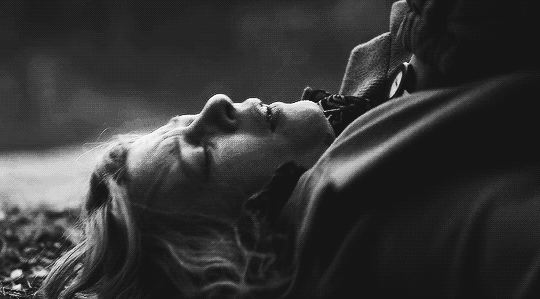Lucemond Textposts: AO3 Tag Edition



Lucemond Textposts: AO3 Tag Edition
More Posts from Papercuts-blog and Others
I'm gonna spam the timeline with secret forest posts!
Could you analyze the scene from ep.12 (the one with the stairs)? It's one of my favorites because defines very well the relationship between Shi-mok and Han Yeo-jin. 😗
Aha, yes!
The stairwell scene is interesting because it’s one of the few scenes in the entire show that’s solely devoted to relationship building, as opposed to having something to do with the case. Relationships obviously develop over the course of the show, but most of it happens in the background/over small details, subtle moments. The stairwell scene stands out because it’s so completely in our face about Shi-mok and Yeo-jin, in a way that stood to highlight how far our favorite duo have come in their relationship despite the setbacks of the first half of the season.
In this Youtube video, you can see one of Shi-mok’s pain episodes in S1 juxtaposed with the stairwell scene in S2. The very first time we see Shi-mok deal with his pain is in S1E6, after he comes back from speaking with his mother. It’s implied that the headache is triggered from his interaction with his mother, who is clearly a source of deep trauma and emotional repression for him, and he deals with the aftermath of his pain alone.
In that scene, he spills an entire bottle of water as he collapses, and he wakes alone to the same puddle of water next to him. No one was there to see him go through his pain, and no one is there to clean up the water for him. He trudges to get a paper towel roll and mops up what he can.
The sheer sense of loneliness and isolation we get from this dialogue-less scene is immense. We’re told throughout the series, in brief subtle moments, that the core of Shi-mok’s emotional state is defined by his isolation. His pain isolated him from his parents and his classmates; his surgery isolates him from the entirety of human society. The only reason Shi-mok seems to be able to deal with his situation is because of his work, the relentless pursuit of justice that seems to anchor him to his identity, and the fact that his lobotomy eliminated the worst of his emotions. Otherwise, I can’t imagine any person actually enduring his situation for the entirety of their adulthood.
Towards the beginning of S1, Shi-mok tells Jung-bon flatly, “You’re right. I don’t have anyone beside me, and I never will.” Jung-bon, who doesn’t know about his condition, would clearly interpret this as Shi-mok refusing to develop a relationship that might alleviate his isolation. But for the viewer who knows about Shi-mok’s condition, it’s clear that he’s simply resigned to the idea of his solitude. He doesn’t expect companionship because of his inability to connect to his emotions, and I think this expectation might have more to do with the other person not accepting his condition than his own lack of desire for connection.
So this is where Shi-mok begins: alone and resigned to being alone.
S1 is spent proving to Shi-mok that he doesn’t have to do the work alone; Yeo-jin is not only a good partner but also a unique conduit for his deeply dormant emotional state. Without crossing the line or breaching his boundaries, she gently points out that he actually can tap into a deeper recess of himself and interact with other people in a way that is meaningful.
At first, he seems almost disturbed by her suggestions that he can feel and act out emotions, but over the course of S1, he reaches a place where he actually does tap into a part of himself that he might not have engaged with for a good part of his life. So Shi-mok’s emotional development over S1 is not just about his fight for justice, but also about him relearning his ability to connect with people.
If S1 is spent with Shi-mok learning about his ability to connect, I think S2 then leads naturally to him learning about his desire to connect. His resignation to his solitude in S1 means he never thinks of friendships, relationships, or human connections as a possibility in his personal life, so naturally, he never seems to ask himself if he wants it in the first place. It makes sense that S1 thus addresses the issue of him realizing that the possibility exists at all, but it never gets far enough to show Shi-mok actively desiring that human connection.
Shi-mok at the beginning of S2 is in a similar place as the beginning of S1, in that he is fairly alone and isolated due to his exile to Tongryeong. It doesn’t seem like he’s kept in regular contact with anyone, not even Yeo-jin, and he clearly hasn’t made any personal connections in his new district office. Yet unlike S1, when this just seemed like a part of his character, Shi-mok in his isolation feels deeply unhappy. We’re given shots of him alone in a hotel room because he’s unable to find a place to stay in Seoul, of him watching families and couples run past his car at a rest stop. They’re very subtle moments, but I think they amount to Shi-mok having a deeper awareness of his own isolation, and perhaps the possibility that he doesn’t actually want to live in such solitude.
And of course, when he sees Yeo-jin again in S2, he is also noticeably different.
S2 is all about Shi-mok reaching out first, even as Yeo-jin draws back further and further due to her own personal emotional arc. Since we’ve discussed all of those moments to death already, there’s something more specific I want to look at: Shi-mok making his personal preferences known.
These are also small moments, hardly relevant to the major plot at hand, but in multiple scenes, Shi-mok openly voices his (food) preferences and Yeo-jin listens. In S2E2, Yeo-jin asks him if he wants to eat stir-fried octopus or hot pot, and Shi-mok, without making the usual polite deferrals or simply ordering on his own, tells her that he wants stir-fried octopus. This repeats in S2E16 (he asks for soju, not makgeolli), and of course, during the stairwell scene In E12.
I think among all the moments in the stairwell scene, I was most surprised when Yeo-jin offers to buy Shi-mok a can of cola for his headache, and he simply accepts the offer. It’s not exactly a personal preference, per se, but it places Shi-mok in a position where he has to decide what he wants. Unlike other acts of care by Yeo-jin (buying him food in S1E6, getting him chamomile tea in S1E12, ordering him another round of cabbage in S2E12), in this particular moment, Shi-mok actually has to actively say whether or not he wants what Yeo-jin is offering. In all of her other moments, Yeo-jin just does the thing — she takes him by the arm to buy him dinner, she shows up at his door with the tea, she orders the cabbage without him asking — but in this particular one, Shi-mok has to agree to receive her kindness.
And he does, without a moment’s hesitation.
Knowing Shi-mok and the way he uses politeness as a barrier and defense mechanism, it would have been natural for him to politely refuse or even simply put up the pretense of hesitation. But much like their dinner scene in S2E2, he doesn’t put up any of those pretenses around Yeo-jin. It shows us clearly that Shi-mok recognizes her kindness for what it is, is grateful for it, and wants it.
The stairwell scene in S2 is a neat piece of writing work, since it gives us a clear moment of personal connection directly following a scene where Shi-mok and Yeo-jin are forced, again, to be on opposite sides. It’s a moment of reconciliation, when both sides (esp. Yeo-jin) have to admit that their personal care for each other transcend the confrontations of being on opposite sides, and it’s also a moment calling back to earlier moments of connection in S1 that serve as the basis of their relationship. After this scene, something significant changes between them — both of them seem to implicitly agree that their partnership is most important and that they’re willing to prioritize their work together before any of the petty politics dividing them.
But it also gives us a significant moment of Shi-mok’s own emotional development, since we see how he is no longer just realizing the possibility of his connection to other people, especially Yeo-jin. He’s making his own (small, small, baby steps) approach to these connections on his end. He’s showing that he does actually have certain desires, preferences, that he is willing to share them with Yeo-jin, and that he’s willing to work on his end to build on whatever connection he has with other people. He’s no longer resigned to his isolation or even just realizing the possibility of potential personal relationships; he’s actively working to build on the one he has, the one that he’s deemed most important.
Reblog if you write fic and people can inbox you random-ass questions about your stories, itemized number lists be damned.
Levihan in 132, not what you thought
To understand 132 and Levi Arkerman as a character, one needs to look at Levi’s whole military life and beyond.
I think 99% of readers failed to notice a critical behavioral pattern from Levi - how he deals with death.
Let me refresh your memory.
In his first appearance in the manga, Levi is holding the hands of a dying comrade and promising him revenge.
The behavioral pattern starts from there.
He stares at Petra’s dead body.

He looks straight into Erwin’s eyes and asks him to die (to give Erwin strength).

Later he stares at Erwin’s dead body.

Even when Hange looks away he keeps staring, imprinting the image of Erwin’s death on his mind.

It keeps evolving.
In the forest he killed all his subordiantes who turned into titans, deliberately stopped to stare at their dead bodies before catching up with Zeke. Though heart-broken for a fleeting moment, Levi, in extreme anger, almost got a… you tell me what experession on his face.

There must be a reason aside from the fact that too many deaths desensitize him to it?
Remember Levi’s childhood trauma?
He was abandoned by Kenny.
Levi copes with his fear for the death of people close to him, the fear of being left behind, by looking at death straight in the eye, sneering at it, metaphorically laughing at it.
Gradually, death fuels his anger, becoming an impetus to drive him forward, in a bone-chilling way it almost excites him, and he unleashes his anger through violence, or in a nicer name, revenge.
Let me reword it in case you think I’m too harsh on Levi:
He avenges his comrades’ deaths to give meaning to their sacrifices; for himself, personally, he deals with death in this way so no one’s death could break him.
He asks his comrades not to die, he wants to save people, as many as possible. But Levi, understanding the inevitability of sacrifice since joinging the Survey Corps, is not scared of anyone’s death. He is Death itself, he is unstoppable.
You can’t scare me, you can’t hurt me.
-
Hange ends it for Levi, right there in 132.
First let me say, what a genius Isayama is!
Once, Kenny left Levi without a word, leaving him in confusion and pain: “why did you leave me that day”? 20-plus years later, Hange attempted to jump off the plane without a word to Levi. She only had a final talk with 104.
It was Levi who stopped her in her track.
Hange orders him to let her go (it’s not a polite ask).
He can’t look at her eyes, he can’t move. Nor could Hange look at his eyes, if she does, she will lose all the strength to go.

The sound of Rumblings and her order are the recipe for Levi’s mental breakdown.

Then comes the salute.
It is an explosive moment ruined by wanton translations, which I will talk about at the end.
Hange walks past him, Levi remains in the same position, refusing to turn around to send her off.

Remember his stare-at-death-and-the-dead way of dealing with his comrades’ sacrifice?
On the plane, while 104 crowd at the window, Levi retreats to his seat, away from the window as if hiding from some monster.
So he would’t have to watch her fall, so there is no image of her death on his mind.

(Note Levi is no longer near the window, he is at the opposite side, and looking downward)
Even better, he mumbles to himself and to her “…see you, Hange”, a pathetic act of self-deception.

A small Japanese language lesson to have a better grasp of it.
じゃあな - what Levi said - is a casual way of saying “see you later” in daily conversations. Like, at the end of a meeting, “it’s 5 pm, let’s call it a day, see ya!”
Say it to a deceased person, people who happen to hear it will freak out and worry about your mental statement. The right word for people you’re never going to meet again is さようなら.
Levi is a kid in denial.
If I can’t accept something, I pretend it doesn’t exist. I say it out loud to convince myself.
No she’s not dead, I will see her later.
-
Ladies and Gentlemen, that’s Levi kneeling in front of Death, covering his eyes and ears - he is scared. Over decades, for the first time, he can’t face it. He fears (her) death.
Here is a Buddhist philosophy regarding love:
Love leads to fear.
-
If I turn around, I will have to watch you go
I will break down, and beg you to stay.

See how Hange triggered Levi’s childhoold trauma of being abandoned by Kenny and it’s worse this time. He has less courage facing it than the little boy 20 years ago.
-
For 132’s “devote the heart” scene, it deserves another long-winded analysis, because again, you need to check the slogan and gesture featured in the manga, not with just a vague memory, and first you need to get the translation right. Not “devote YOUR heart”, no.
Coming soon…
-
Speaking of Levi’s chilldhood trauma, Hange taking care of him with love and tenderness, protecting him, keeping him alive, is a reminder of mom’s unconditional love.
I will save the analysis for another day. Isayama’s genius play shouldn’t go unnoticed - Pietà! (When is Levi’s brithday? Chritsmas)
All I’m saying is, the love Levi recieved and the pain he endured during his childhood, all came back and culminated in his relationship with Hange.
I don’t know why Isayama applies such aesthetics and narrative skills of literature level to a manga couple. It’s too too too much for average readers and anime watchers.






Aemond Targaryen and Lucerys Velaryon
House of the Dragon (2022-)
Diary Blog: Letter to myself
"After years of overthinking and analysing I came to a conclusion about relationship. Exactly, why my relationships never lasts. You know, sometimes people doesn't put the same value to the things as you do. I'm not talking about romantical relationship, because you're going into that kind of attachment with some kind of expectations, you want love, just attachment maybe. I'm talking about friendships! I always kept my expectations low, as long I'm not expecting that person to do anything, I'm not overthinking. I remember telling someone to just text me whenever you can after your flight lands, they didn't even though they said they would! I waited the whole day and again realise why I don't have any expectations from people anymore. Expectations are the root of every problems. I don't think it's requires a lot of space or time to text someone, if any person couldn't find five seconds of their precious time to spend on the person they said their close friend, I can't stop myself thinking if I have any value in that person's life anymore. But at the same time I also think, no body is entitled to spend their time on anyone, there might be lot's of things that I don't know that they might be facing, struggling through. But I still can't stop myself from hoping. I can't stop myself from begging to have footnotes in their stories! I don't know I'm just incredibly heartbroken." I'm in dilemma!
A diary full of letters which I'll never publish 🍂🍂
This is it! And people out there describing this as "mild criticism" is just being ignorant at this point.
i kind of don’t like Taylor describing what happened to her in 2016 as ‘getting cancelled’ because it definitely wasn’t. it was a whole different beast. getting ‘cancelled’ is people finding out something about you, talking about it for a week, causing you to take like 3 weeks off and then everyone just moves on. she had a grown man who was weirdly obsessed with her since she was 19 publicly discredit her art and sexualize her to the entire world, put her in a revenge-porn style music video with a wax figure depicting her naked body without her consent, had a crowd of tens of thousands of people say ‘fuck taylor swift’, had a mural painted of her death, and went into hiding for almost two years. ‘getting cancelled’ involves a few tweets and an apology note…. not years and years of therapy.
She's the MAN

TAYLOR SWIFT The Eras Tour - Buenos Aires, Argentina - November 9th, 2023. Photo by unknown.
To me this is the most tragic thing in the whole series ! 😔







D A R K ➝ 02.06 x 3.05
I know nobody cares and I'm not doing this for fun or something like that. I did something wrong to my best friend, I forgot to say some important things to her related to education. I swear I didn't do it knowingly . I said sorry and she said everything was fine and stuff. But now we don't talk like before, not texting at all. I tried to talk with her but she replied in one word or two. I don't know what to do anymore so I posted funnny things in my story and I rarely put any post in my story but whenever I did that she always replied. I tried that to see if she will reply or not. I posted in my story for 3 days continuously she watched them but never replied. This is the end right. I'm so easy as a person to be left behind and people always did that to me. But every time I moved on. But now, I'm thinking should I even try to make friends anymore. Because what's the point ?! I'm always replaceable.


The power couple has arrived at the met gala✨
Dress Inspired by pinterest
-
 flowerdoll23 liked this · 1 month ago
flowerdoll23 liked this · 1 month ago -
 ghostlybreadmilkshake liked this · 5 months ago
ghostlybreadmilkshake liked this · 5 months ago -
 sarouslittleworlds liked this · 7 months ago
sarouslittleworlds liked this · 7 months ago -
 danxiex0 liked this · 7 months ago
danxiex0 liked this · 7 months ago -
 anastagloss liked this · 8 months ago
anastagloss liked this · 8 months ago -
 skinnedlynn liked this · 8 months ago
skinnedlynn liked this · 8 months ago -
 ziggythesadwriter liked this · 8 months ago
ziggythesadwriter liked this · 8 months ago -
 yewsnake liked this · 9 months ago
yewsnake liked this · 9 months ago -
 daxai123 liked this · 9 months ago
daxai123 liked this · 9 months ago -
 merquriie liked this · 9 months ago
merquriie liked this · 9 months ago -
 winter0045 liked this · 9 months ago
winter0045 liked this · 9 months ago -
 elin-moon liked this · 9 months ago
elin-moon liked this · 9 months ago -
 alexai250788 liked this · 9 months ago
alexai250788 liked this · 9 months ago -
 ohthisisawkward liked this · 9 months ago
ohthisisawkward liked this · 9 months ago -
 marauders-mischief-managed liked this · 9 months ago
marauders-mischief-managed liked this · 9 months ago -
 godofstory liked this · 10 months ago
godofstory liked this · 10 months ago -
 reynobody liked this · 10 months ago
reynobody liked this · 10 months ago -
 roseh136 liked this · 10 months ago
roseh136 liked this · 10 months ago -
 annagotopaul reblogged this · 10 months ago
annagotopaul reblogged this · 10 months ago -
 skyllabau reblogged this · 10 months ago
skyllabau reblogged this · 10 months ago -
 skyllabau liked this · 10 months ago
skyllabau liked this · 10 months ago -
 wisegladiatorkitty liked this · 10 months ago
wisegladiatorkitty liked this · 10 months ago -
 punkteenz reblogged this · 10 months ago
punkteenz reblogged this · 10 months ago -
 pebbles-are-soft liked this · 10 months ago
pebbles-are-soft liked this · 10 months ago -
 fauxregina liked this · 10 months ago
fauxregina liked this · 10 months ago -
 myriadnarratives liked this · 10 months ago
myriadnarratives liked this · 10 months ago -
 raske-boiii liked this · 10 months ago
raske-boiii liked this · 10 months ago -
 liverpoolmine03 liked this · 10 months ago
liverpoolmine03 liked this · 10 months ago -
 blueecookies liked this · 10 months ago
blueecookies liked this · 10 months ago -
 depressedreader03 liked this · 10 months ago
depressedreader03 liked this · 10 months ago -
 karmaisabtch liked this · 10 months ago
karmaisabtch liked this · 10 months ago -
 ororonebbia liked this · 10 months ago
ororonebbia liked this · 10 months ago -
 greatest-sorceress liked this · 10 months ago
greatest-sorceress liked this · 10 months ago -
 zachariesmackthee liked this · 10 months ago
zachariesmackthee liked this · 10 months ago -
 yute15 liked this · 10 months ago
yute15 liked this · 10 months ago -
 estherk606 liked this · 10 months ago
estherk606 liked this · 10 months ago -
 bmyngpw liked this · 10 months ago
bmyngpw liked this · 10 months ago -
 beelzielord liked this · 10 months ago
beelzielord liked this · 10 months ago -
 koisaru liked this · 10 months ago
koisaru liked this · 10 months ago -
 ma-du liked this · 10 months ago
ma-du liked this · 10 months ago -
 charcoalruid reblogged this · 10 months ago
charcoalruid reblogged this · 10 months ago -
 charcoalruid liked this · 10 months ago
charcoalruid liked this · 10 months ago -
 kis-beka liked this · 10 months ago
kis-beka liked this · 10 months ago -
 pineappleslush liked this · 10 months ago
pineappleslush liked this · 10 months ago -
 knightoferebus-sw-dc liked this · 11 months ago
knightoferebus-sw-dc liked this · 11 months ago -
 tackletofset liked this · 11 months ago
tackletofset liked this · 11 months ago -
 mandlebug99 liked this · 11 months ago
mandlebug99 liked this · 11 months ago -
 ikwhatyouaremikewheeler liked this · 11 months ago
ikwhatyouaremikewheeler liked this · 11 months ago -
 ilovemyfoodsomuch liked this · 11 months ago
ilovemyfoodsomuch liked this · 11 months ago
